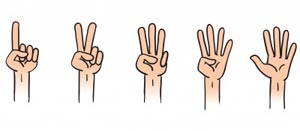Poker Outs – Counting Outs in Texas Holdem
 To become a better poker player, you must rely on a concept that involves a bit of mathematics.
To become a better poker player, you must rely on a concept that involves a bit of mathematics.
The word maths may scare players into thinking that they can never succeed in poker because numbers aren’t their strong point, but if you can add or subtract, you will do just fine.
The skill of counting Poker Outs discussed in this article is a simple, yet crucial concept. Knowing how many outs you have and how to calculate them correctly will be one of the most important steps to becoming a better player.
What are Poker Outs?
An out in poker terms, is a card that, if it is dealt next, can improve your hand. A good example would be when you already have 4 cards of the same suit and need 1 more to complete a Flush. That 1 card needed is called an out. In this situation you would have many outs, as there are many cards of that suit that could be dealt and improve your hand, each one of them would be an “out”.
There are many other instances where outs come into play and will often times be a key factor for the basis of your decisions.
Counting Outs
Counting outs is a very simple process that involves simple addition and subtraction. You first need to determine what your current hand strength is and what cards could help you improve to a hand that would win the pot.
Even if you haven’t yet made a hand, you still have outs to make a better hand. If you hold A-K, your outs with no straight or flush draw would be the remaining Aces and Kings. Any one of these cards will improve your hand.
We use simple maths to calculate our outs. There are 4 of each rank in a 52 card deck, one in each suit. This gives us 4 Aces and 4 Kings for a total of 8 available. However, we subtract the two cards in our hand and that gives 3 outs of each rank. So here we have a total of 6 outs to make a better hand.
So what do I use this Information for?
Knowing how many outs you have will help to make decisions during a hand and can help determine if certain situations will warrant a call or a fold.
In a hand where you are drawing to a flush, you will likely have 9 outs (13 cards in a suit, less the 4 you already have) that will make the best hand. You can then use the number of outs you have to assess the likelihood of you actually making that hand. Once you know this then you can look at how much money you would win in the pot and assess if the risk you are taking is worth it.
The amount of money you would win from a pot compared to the amount of chips you would have to put into the pot for the bet is called the pot odds in poker, and we use both the pot odds and the number of outs (probability of winning the hand) to reach a decision. If the pot odds offered are more than the likelihood of you winning the hand, then mathematically it is a good proposition and vice versa.
Often times players make the mistake of calling a bet when they are getting incorrect odds. This is a costly mistake that adds up over time and will assure you to be a losing player in the long run.
Odds and outs have their own special place in poker, but the two are directly connected. In order to know the odds you are getting, you must know how many outs you have. We will take a look in more detail at Poker Pot Odds in the next article.
Discounted Outs
A common mistake players make is to count all the outs that would make them a better hand without regards to what their opponent may have, or the board texture. A “discounted out” is a card that will improve your hand, but may also make a better one for your opponent, making it useless and should not be counted as an out.
You also can only count outs if they are going to produce the winning hand. So there is no point counting outs to hit a hand which your opponent already has beat. So you will need to use your judgement in deciding if an improved hand an out would lead to, would actually beat your opponent(s).
Let’s assume you have the A-K unsuited again. The flop comes down Jd, 2c, 5d. A quick analysis of the flop and we can deduce that there is a potential flush (with two diamonds) and straight draw (anyone holding 3-4) out on the flop. You have no diamonds in your hand and you only have Ace high at the moment.
Many players will use the 3 Kings and 3 Aces when counting their outs in this type of hand. However, if we think about what happens when the Ace of Diamonds comes on the turn or river, what will happen?
The Ace, although it gives you top pair and top kicker, could be the worst possible card for you. The Ace of Diamonds completes both draws that are on the board. The Diamond for the flush and the Ace completes the straight if someone had 3-4 in their hand.
It’s important to understand what happens when the outs you have, do come. Always think about if it will not only improve your hand, but your opponents as well.
In this situation you would have to consider what kind of hand your opponent is playing based on their actions and if you think they could be on such a draw then you cannot count these outs and you must “discount” them.
Using the example above, lets say we are up against an opponent who has raised before the flop from early position. We can use that information to deduce that unless our opponent is a wild and reckless player, with a raise from early position having 3-4 in their hand is very unlikely. Not many players will raise 3-4 from early position, if at all. Therefore we can safely assume that the Ace will not help our opponents hand in this case. We still need to be wary of another diamond falling, but can safely assume a non-Diamond Ace will give us the best hand.
Knowing your outs is obviously important in Texas Holdem, but it’s also crucial that you understand how to apply them correctly. Always being aware of your position at the table will greatly help to use outs to gain more information during the hand and help to put your opponents on hands. It’s not all about knowing where you stand, it’s also about knowing what your opponents may have as well.
Now that you understand how to count your outs, then our next article will take a look at Pot Odds and how they interact with Outs.

Trust & Security
I'll only recommend Safe & Trusted sites with a proven track record
By Game Type
Different rooms are better for different game types & stakes
Beginner Friendly
I'll find you a site with players of a similar skill level
Promotions
I'll find you the best value Promotions, Bonus & Freebies!

 Return to the
Return to the 
